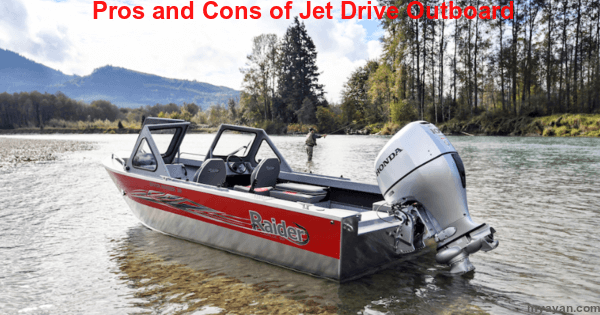When it comes to powering watercraft, various options are available in the market. Jet drive outboards have gained popularity among water enthusiasts for their unique propulsion system. Unlike traditional propeller-driven outboards, jet drives utilize a water pump to generate thrust, offering a thrilling experience on the open waters. In this blog post, we will delve into the pros and cons of jet drive outboards, providing valuable insights and helping you make an informed decision if you're considering investing in one.
For starters and amateurs, there are many pros of Jet Drive Outboard. Some of the prominent ones include:
One of the significant advantages of jet drive outboards is their exceptional manoeuvrability in shallow waters. Traditional propeller-driven outboards are restricted by their lower unit's depth, making them susceptible to damage when navigating shallower areas. However, jet drives operate by drawing water from below the vessel and expelling it through a nozzle at high pressure, allowing you to navigate smoothly, even in shallow depths, without worrying about damaging your propulsion system.
Jet drive outboards offer enhanced safety features compared to traditional propellers, making them an appealing choice for families and recreational users. With no exposed blades or rotating parts outside the boat's hull, there is a reduced risk of accidents or injuries caused by accidental contact with the propeller. This makes jet drive outboards particularly suitable for activities such as swimming or water sports where people may be close to the boat.
One standout advantage of jet drives is their superior manoeuvrability at low speeds. Whether you're docking your boat or navigating through tight channels or marinas, jet drives provide precise control and responsiveness even when operating at slower speeds. This makes it easier for novice boaters to confidently handle their vessels while minimizing the chances of accidental collisions or damage.
Jet drive outboards are designed to have a minimal draft, which refers to the distance between the waterline and the lowest point of the boat's hull. This feature allows you to explore shallow water bodies that are typically inaccessible to vessels with deeper drafts. Whether you're venturing into winding rivers, exploring hidden coves, or cruising through marshy areas, a jet drive outboard enables you to easily navigate and embark on exciting adventures in previously uncharted territories.
Jet drives are known for their durability and longevity. With fewer moving parts compared to traditional propellers, less maintenance is required, resulting in reduced wear and tear over time. Additionally, the absence of an exposed propeller means less risk of damage caused by hitting underwater obstacles like rocks or submerged logs. This increased durability translates into lower maintenance costs and a longer lifespan for your propulsion system.
Some of the major cons of Jet Drive Outboard include:
While jet drive outboards offer impressive maneuverability at low speeds, they tend to be less efficient for high-speed cruising. The propulsion water pump consumes more fuel than a traditional propeller-driven outboard, resulting in reduced fuel efficiency and top speed.
One drawback of jet drives is their limited reverse control. Traditional propellers offer precise and powerful reverse thrust, allowing for more controlled maneuvers in tight spaces or when docking. On the other hand, jet drive outboards rely on steering and throttle adjustments to navigate in reverse, which may take some time for experienced boaters.
One of the downsides of jet drive outboards is their susceptibility to debris. As they operate by drawing water from below the vessel, any large or solid objects in the water can potentially clog or damage the impeller, resulting in reduced performance or even complete failure. This makes it essential to carefully navigate and avoid areas with high concentrations of debris when using a jet drive outboard.
Jet drive outboards tend to be more expensive compared to traditional propeller-driven outboards. This is due to the complex propulsion system and technology used in their manufacture. Additionally, as they become increasingly popular, the demand for jet drive outboards has increased, increasing their initial cost.
Jet drives produce more noise than traditional propellers, which can be a disadvantage for some boaters. While modern jet drive systems have improved significantly in noise reduction, they still tend to be noisier than traditional outboards.
Jet drive outboards offer numerous advantages, making them an enticing option for consumers and fun-seekers. From their remarkable maneuverability in shallow waters to enhanced safety features and increased durability, these propulsion systems provide an exhilarating yet reliable experience on the water. However, it's essential to consider factors such as reduced top speed compared to traditional outboards and potentially higher initial costs. By weighing the Pros and Cons of Jet Drive Outboard, you can determine if it matches your needs and preferences.

First and foremost, durability may pose a concern regarding this particular type of drive. The engines operate at higher RPMs to rotate the impeller, accelerating the components' wear and tear. Moreover, the increased RPMs contribute to heightened noise levels and diminished fuel efficiency, prompting specific boat shoppers to explore alternative options.
One significant benefit of jet boats is their ability to navigate shallow waters more effectively than outboards and sterndrives. This is due to the absence of an external propeller that could potentially get damaged. If you enjoy fishing in rivers with shallow areas, a jet boat could be your ideal choice.
Boats equipped with jet drives have always boasted about their remarkable shallow draft. Unlike stern drives, jet drives require only a draft as deep as the hull. This enables them to navigate through shallow waters effortlessly, eliminating concerns about running aground or damaging the drive in narrow channels.
Jet engines may face greater challenges in terms of durability and wear compared to sterndrive or outboard engines. This is primarily due to the higher rpm levels at which jets operate. These elevated rpm levels also impact fuel consumption, and subpar fuel economy can be a deal breaker for many individuals.